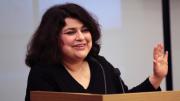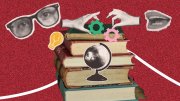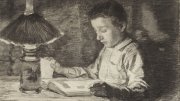I’ll begin, straight off, with losing.”
As far as opening remarks go, those words wouldn’t seem to augur well for the ensuing speech. But on Thursday night at Dumbarton Oaks in Washington, D.C., as part of a series of talks on careers in the humanities, Sharmila Sen, executive editor-at-large at Harvard University Press, managed to imbue them with unexpected glee.
What followed was a series of confessions as Sen recounted the remarkable, remembered “failures” that stippled her studies and early academic career. (She was an assistant professor of English at Harvard from 1999 to 2006.)
Her beginning, in a semi-conspiratorial whisper: “I failed my programming exam at Harvard when I was a freshman.” At a time when incoming freshmen were required to pass not only the standard language and writing proficiency tests but also a programming test in BASIC, this gave Sen a dubious distinction—she began her undergraduate career on academic probation.
“But I didn’t learn my lesson,” Sen went on. After taking an English class to satisfy a requirement, she received a letter from her professor, asking to meet. Wary of further reprimand, she showed up on her guard, but was thrown for a loop when the professor asked if she’d ever considered switching her concentration from mathematics. “I looked at her, I was probably 18 at the time, and I said—and here’s mistake number two—‘Professor, I’m too old.’”
Despite her precocious stolidity, Sen was eventually swayed. Graduating with a degree in English, Sen, who moved to the United States at 12 after growing up in Calcutta, spent a year teaching in an international boarding school at the foot of the Himalayas, whence she returned to begin her graduate studies at Yale. There, having learned a lot but evidently not quite enough, she promptly failed, right at the start, once more.
“I went to graduate school, and you know what happened? I failed my Latin exam,” Sen explained, speaking of her past self—as she did throughout her talk—with wry incredulousness. “And you know why? Because I’d never studied Latin.” As the laughter in the room slowed and ceased, Sen entered a new phase of her talk, describing the institutional roadblocks she ran up against at Yale and the confrontations with language that shaped her academic career and interests.
“Those weren’t the good old days,” Sen recalled. “Languages had to be Europhone. We used to be told some of our languages didn’t count [for the language requirement] because we were native speakers, because we had ‘native speaker abilities.’ So some of us would huddle in the library and we’d whisper, ‘Well, that French student got to take the French exam,’ and so on.”
In response, Sen threw herself into language. She recalled an adviser saying: “You have to learn how to fail; you have to learn how to lose the game. If only because then you have to figure out, What are you going to do with that?” With vim, vigor, and probably a tincture of impatience, she signed up for three simultaneous Latin courses—beginning, intermediate, and advanced—in a single summer. “I can remember that somewhere in the middle of the summer the intermediate class started making sense, and somewhere towards the end I began to see what was going on in the advanced class.” A key moment in her studies occurred when she realized she could speed up her translation of Latin by rerouting it through her mother tongue. “I started this trick: I would translate Caesar into Bengali, and then from Bengali to English really fast, because I’d walked that path before—for almost 25 years of my life, at that point.”
As Sen moved from speaking about her academic career to her transition to the publishing industry, her talk debouched, in turn, from personal narrative into a broader discussion of the humanities and humanistic careers. At the same time, she elaborated on thematic threads nascent in her previous comments, among them the power of chance, the importance of others, and the practical concerns that often determine the directions our lives take.
In September 2006, after seven years as an assistant professor of English at Harvard, Sen decided to make a career move, though not so much a physical one. Getting a job as an acquisitons editor at Harvard University Press with no experience to speak of, and determined to combat the general preconception that “humanists must be impractical,” bumbling technophobes, Sen simply followed her curiosity, asking questions when the industry jargon—F&Gs, PP&Bs, P&Ls—bemused her, soliciting tutorials from senior staff, and finding her way into every crevice of the production cycle. “It really is so important to be curious about everything,” she said. “To be constantly attuned to how others are thinking about and considering a problem, to be aware of the linkages between individuals—it all helps us make better decisions.”
If any steadfast theme emerged from Sen’s talk, it was a concern with those sudden, blindsiding moments that tend to upend the cozy narratives—of lives, of careers—that we compose for ourselves. As she observed, this unpredictability is best countered by a willingness to plunge headlong into unaccustomed environments and new circumstances—an ability especially valuable for budding humanists.
“To throw yourself into strange waters—beautiful waters, but still strange—to do different things, things you might not be so good at, is scary,” she emphasized. And yet, Sen believes this leap-taking is integral to success in the humanities. Other professions may offer a clearly defined path—the courses to be taken, the graduate schools to be applied to, the licensing exams to struggle through—leading up to entry in the field, but in the humanities, that’s often not the case. “It’s so much easier to lose our way in the humanities,” Sen explained, “if only because the door to the humanities—to a life, a career in the humanities—is so much harder to discern.”
For Sen, the widely peddled narrative of a “decline” in the value of the humanities avoids the real heart of the matter. “Almost since their birth the humanities have seen themselves as under crisis. That’s part of the genetic code of being a humanist,” she said, managing to elicit laughter from a room full of humanists. “You have to feel as though you’re born in decline.”
In reality, as Sen contended, external factors carry less weight than the internal mood of the humanities. In her view, the greatest threat to the humanities—including the publishing world—might be the pessimism she sometimes sees about her, an obsessive peddling of spooky statistics—the lack of jobs, the decline in funding, the general morbidity of the field—that’s all too frequently counterproductive.
“I come across a lot of people in my work who use pessimism to show off their professional bona fides,” she explained, closing the talk. “But when you act like that, and talk like that, only the most stubborn young people are going to enter your field.”









